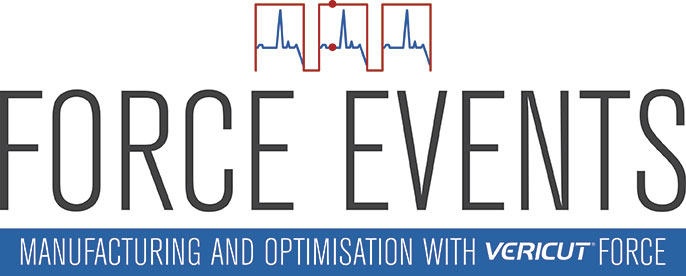Header
CGTech Releases Force Calibration Software
-
FOR IMMEDIATE RELEASE
Contact: Jodie Cosby
Tel: 07824379438
Jodie.cosby@cgtech.com
Hove, England – To support the use of its physics-based Vericut Force optimisation module, CGTech has developed a bespoke software package to help users calibrate the software such that it can replicate the cutting conditions which would be achieved in real-world applications. Force Calibration software was recently unveiled at the University of Sheffield’s Advanced Manufacturing Research Centre (AMRC).

Force Calibration is a software program that enables material calibration for use with Force CNC program optimisation (milling or turning) via a material characterisation file. The encrypted Force material characterisation files used by Vericut’s physics-based Force optimisation module depend on cutter material and the material being cut, and are applied to any simulation run to achieve the most efficient NC machining program.
Data for Force material files comes from a series of test cuts on a CNC mill and/or lathe with a dynamometer set up, using a specific cutting tool and the workpiece material to be characterised. Having input details of the material to be cut into the software, plus cutter material and geometry data, milling and turning cutting trials were conducted in the AMRC’s machine shop. Eight-channel Kistler dynamometers fitted to the machine tools measured the actual cutting forces generated throughout the trials.
There are five steps required to capture the data, according to CGTech Vericut product specialist, Pete Haas. “We consider step one as administration and planning, where the raw material and cutting tool are procured along with the determination of the location and actual machine tool to be used,” he says. “Step two includes the design of experiment, NC program creation and set-up instructions.
“Force Calibration comes in for step three, with the set-up of the machine tool and dynamometer, preparation of the stock material, and running the cutting test, with captured data converted for use in the software,” he continues. “With the data loaded into Force Calibration we can subsequently calibrate the material and validate the results for steps four and five.
“Of course, there is a presumption that the knowledge and experience required to make these final steps work are available. An understanding of cutting tools, tool holders and materials is required, along with the skills to get any information needed. Programming and machining knowledge for NC macros and CNC machine operation, along with the engineering knowledge required to use the dynamometer, will also be necessary.”
Managing director Tony Shrewsbury adds: “Calibration is not for every business – many things can go wrong – experience, training and problem resolution skills are needed. We also appreciate that many engineering companies do not have access to all the hardware required to run a calibration test, so we offer this as a cost-effective technical service.
“Materials only need to be calibrated once and an ISO standard range of over 100 materials is already held in the CGTech materials catalogue, which is available to customers upon request. We are adding to these each time we run a new material calibration test.”
The Force module within Vericut uses a physics-based optimisation method to determine the maximum reliable feed rate for a given cutting condition based on four factors: force on the cutter, spindle power, maximum chip thickness, and maximum allowable feed rate. Force calculates feed rates by analysing tool geometry and performance parameters, material properties of the stock and cutting tool, detailed cutting tool edge geometry, and Vericut cut-by-cut contact conditions.
Says Haas: “By far the most powerful and important feature of Force is its understanding of the 3D material removal interaction between arbitrary shaped cutters and workpieces for arbitrary motion in space. The improved cutting and time savings are substantial with the Force optimisation module, and would be a great benefit to any company removing material.”
Adds Shrewsbury: “Force is founded on machining fundamentals; it is easy to set up and easy to use once the materials have been characterised. Users can expect to see improvements of up to 50%.
“Advanced manufacturing businesses within the aerospace or medical sectors, for example, should consider Force Calibration for any unique or proprietary materials. It would ensure the material is machined as efficiently as possible and that the details of its characteristics remain in-house.”
About CGTech
CGTech’s VERICUT® software is the standard for CNC simulation, verification, optimisation, analysis, and additive manufacturing. CGTech also offers programming and simulation software for composites automated fiber-placement, tape-laying, and drilling/fastening CNC machines. VERICUT software is used by companies of different sizes in all industries. Established in 1988, and headquartered in Irvine, California; CGTech has an extensive network of offices and resellers throughout the world. For more information, visit the CGTech website at www.cgtech.co.uk, call +44 (0)1273 773538, or email info.uk@cgtech.com.
Prodotti
Soluzioni
Servizi & Supporto
Società

 Germany
Germany Italy
Italy USA
USA South Korea
South Korea UK
UK India
India France
France China
China Japan
Japan